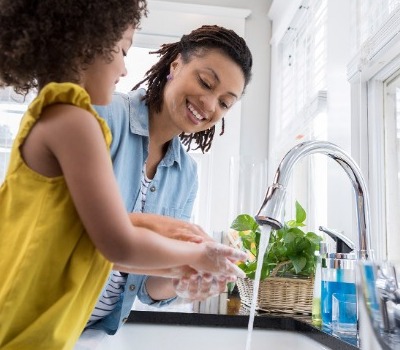Both waters softeners and water filters serve important purposes in our homes and places of business, so it’s no surprise the two have a number of similarities. Both are used primarily to eliminate contaminants and mineral deposits from our water that can cause harm to our bodies and our homes.
But what exactly is the difference between a water softener and a water filter?
Here is a closer look at the benefits of both and how the two processes differ from one another.
But first…
What is hard water?
The aforementioned unsoftened or unfiltered water is commonly referred to as “hard water.”
Water hardness is primarily a result of dissolved calcium and magnesium content, and it generally takes two forms – carbonate and non-carbonate.
Carbonate hardness is less of an issue as it can be removed simply by boiling the water.
Non-carbonate hardness, however, is more complex and requires softening or filtration in order to do away with.
Water hardness is measured in hard water compounds per liter. Water is generally considered hard if it contains more than 120 mg/L of hard water minerals. Municipal tap water can contain high levels of hardness, which can make installing a water softener or whole house water filter system in your home especially beneficial.
Let’s take a look at the main benefits of soft water.
Soft water benefits
- Reduced limescale buildup – Hard water minerals can cause limescale to build up on household surfaces, in your plumbing, and in appliances. Soft water eliminates these minerals before they can make their way to your faucet.
- Prolonged life of appliances – Scale buildup also accelerates the wear and tear of your appliances such as dishwashers and washing machines. Water softening can slow this process and preserve your appliances’ condition.
- Reduced utilities bills – Hard water causes minerals to build up in your pipes, forcing your home’s plumbing to work harder in order to send water throughout the house. A water softener can reduce this buildup and promote smooth, efficient flow throughout your pipes.
- Softer skin and hair – Hard minerals in water can dry out your skin and hair and can also block up your pores. Using soft water hydrates your skin and ensures silky smooth hair.
- Cleaner dishes – Hard water minerals stain and cloud dishware and can make them brittle and prone to chipping and cracking. Soft water takes better care of your dishes and preserves their condition for longer.
- Brighter, softer laundry – Hard water causes clothing to become rough and scratchy in the wash and can also fade colors faster. Soft water keep linens fluffy and soft and keeps clothes looking vibrant wash after wash.
Now let’s take a look at the main benefits of filtered water.
Filtered water benefits
- Cleaner water – Water filtration uses the process of reverse osmosis to kill bacteria and minerals before using water to drink, bathe, or perform household chores.
- Better-tasting water – Unfiltered water often has an unpleasant taste and odor as a result of its contents. A water filter provides clean, great-tasting water you’ll enjoy drinking each and every day.
- Water that’s better for you – Many of the contaminants in unfiltered water can take a toll on your body inside and out, including causing irritation to skin and eyes. A water filtration system makes water safer to use in bathing and other household tasks.
- Water that saves you money – Using a water filter eliminates the need to purchase bottled water ever again. It also slows the toll on your appliances and fosters a healthier plumbing system in the home.
It’s worth noting that most municipal water systems typically treat their water – but that doesn’t mean it’s completely contaminant-free once it reaches your house. As it travels through city plumbing, it can pick up a number of unwanted substances along the way. Home water filter systems combat this by cleaning your water moments before it exits the tap.
You may have noticed that many of the benefits of water softening and water filtering are similar – but it’s how each process goes about delivering those benefits that varies. Here’s a breakdown of how water softening works versus how water filtration works.
How water softening works
Water softeners use an ion exchange process to eliminate dissolved minerals that are not as efficiently removed by mechanical filtration. This process is facilitated by resin beads in the softener tank that are charged with sodium ions.
Basically, as water enters the tank, the dissolved materials become attached to the sodium-charged resin beads as a result of the sodium being released into the water – thus eliminating them and softening the water.
How water filtration works
Water filters use the reverse osmosis process to eliminate contaminants and reduce impurities in your water.
This occurs as water moves through a semi-permeable membrane in the filter that traps and removes nearly 50 different types of chemical and impurities (such as lead and sodium).
Do I need both a water softener and a water filter?
Because water softening and water filtration use different processes to remove different contaminants, it’s not fair to assume one can play both roles. The best way to ensure soft, clean, maximum-quality water for your home or business is to have both solutions installed.
Start giving your people better water with Culligan
The first step in determining your water softening or water filtration needs is to undergo a free in-home water test. This will identify the contents of your water and will help determine the proper next steps for your household.
From there, Culligan Water offers both rental and purchase options for our water softeners and water filtration systems. We will work with you to determine the best solution based on your home or office setting, amount of water usage, budget, and more.
Culligan Water also installs and provides expert maintenance for both water softeners and filters. We’ll even deliver bags of softener salt right to your door to spare you the heavy lifting.
Contact us today to start giving your people the water they deserve.





